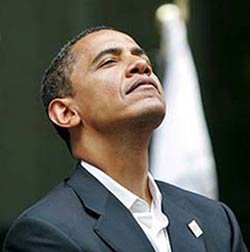Dissent Viewed as”Disinformation”
Barack Obama, Left-wing Intolerance, Unjustified Left-wing Arrogance

Barack Obama epitomizes perfectly the unjustified self-regard, complacency, and arrogance of our Cliff Notes Elite.
In the Wall Street Journal, Barton Swain points out the dangerous delusion endemic within the airhead Left that leads them to imagine that they are entitled to suppress opinions contrary to their own.
One of the great ironies of American political life in the 2020s is that the people most exercised about the spread of false information are frequently peddlers of it. Their lack of self-understanding arises from the belief that the primary factor separating their side from the other side isn’t ideology, principle or moral vision but information—raw data requiring no interpretation and no argument over its importance. It is a hopelessly simpleminded worldview—no one apprehends reality without the aid of interpretive lenses. And it is a dangerous one.
The roots of this self-deceiving outlook are complicated but worth a brief look.
The animating doctrine of early-20th-century Progressivism, with its faith in the perfectibility of man, held that social ills could be corrected by means of education. People do bad things, in this view, because they don’t know any better; they harm themselves and others because they have bad information. That view is almost totally false, as a moment’s reflection on the many monstrous acts perpetrated by highly educated and well-informed criminals and tyrants should indicate. But it is an attractive doctrine for a certain kind of credentialed and self-assured rationalist. It places power, including the power to define what counts as “good” information, in the hands of people like himself.
There was also, among a host of intellectuals in the middle of the last century, the expectation of a “postpartisan” future of technocratic centrism in which the large ideological questions are mostly settled. What is mainly needed from the political process, the thinking went, isn’t visionary leadership but skillful management. Arthur M. Schlesinger Jr.’s “The Vital Center” (1949) is an expression of that outlook, as are John Kenneth Galbraith’s “The Affluent Society” (1958) and Daniel Bell’s “The End of Ideology” (1960). These writers wanted the cool control of experts, not the messy brawling of democracy, which they felt lent itself too easily to revolution. “The tendency to convert concrete issues into ideological problems, to invest them with moral color and high emotional charge,” Bell wrote, “is to invite conflicts which can only damage a society.”
The technocratic impulse is now an integral part of our politics. Those most given to it tend to view themselves not as adherents of any conception of political life but simply as people who acknowledge the world as it is. They regard differing outlooks as deviations from reality that can only cause trouble for no good reason. They believe their critics, who look at the same facts but draw different conclusions, aren’t simply mistaken but irrational, corrupt or both.
No politician deployed the rhetoric of technocratic postpartisanship more openly than Mr. Obama. In a 2007 speech to Google employees, early in his campaign for president, he expressed it concisely. “The American people at their core are a decent people,” he allowed. “There’s a generosity of spirit there, and there’s common sense there.” You could hear the “but” coming. “But,” he said, “it’s not tapped.”
He continued: “Mainly people—they’re just misinformed, or they are too busy, they’re trying to get their kids to school, they’re working, they just don’t have enough information, or they’re not professionals at sorting out all the information that’s out there, and so our political process gets skewed. But if you guys give them good information, their instincts are good and they will make good decisions. And the president has the bully pulpit to give them good information.”
The self-regard implicit in that observation is astounding. More important is its naiveté. The prevalence of bad information is nothing new. Lies, half-truths, wild exaggerations and farcical inventions are part of democratic politics and always have been. Mr. Obama’s remarks reveal a failure to understand that large, complex arguments always involve assumptions and philosophical commitments arising from background, experience and personality.
For him—and he shows no signs of change since he made those remarks 15 years ago—politics is a simple Manichaean struggle in which the righteous and well-intentioned use good data, and the malign and ignorant use bad. Mr. Obama’s most ardent admirers, accordingly—I think of the founders of the “explainer” site Vox.com—view themselves not as proponents of a particular ideological conviction but as disseminators of good data.



